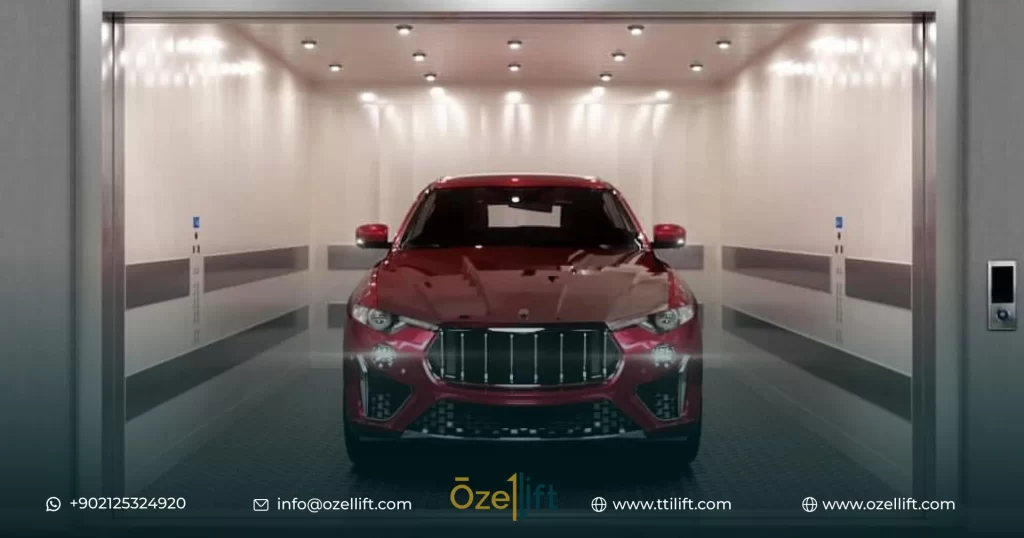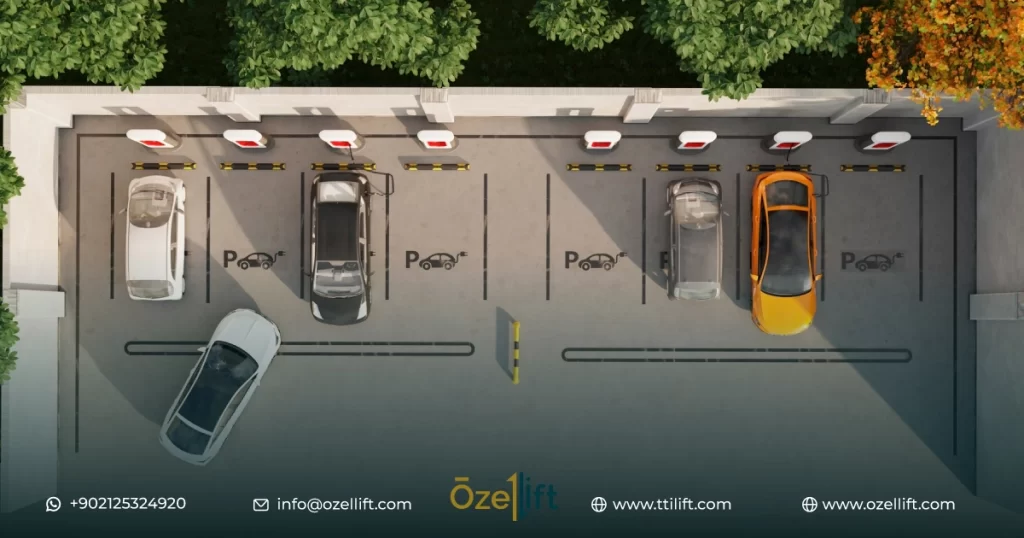Car elevator cost can vary significantly depending on several factors, impacting your final decision. This article delves into the key variables that influence car elevator price, helping you navigate your options and estimate the investment required for your specific needs.
By the end of this article, you’ll have a clear understanding of what to expect in terms of pricing and whether a car elevator is the right choice for you. So, let’s dive in and explore the exciting world of car elevators and their costs!
Average Car Elevator Cost
On average, a basic car elevator system can range from $10,000 to $30,000. This includes the lift mechanism, controls, and basic safety features. However, it’s important to note that this is just the starting point, and additional expenses should be considered.
The cost can increase based on the type of elevator chosen and any customization options desired. For example, a four-post car elevator that can accommodate multiple vehicles may cost between $30,000 to $50,000. On the other hand, a high-end luxury car elevator with advanced features and custom finishes can exceed $100,000.
It’s crucial to work with a reputable car elevator provider who can assess your specific needs and provide an accurate cost estimate. They will consider factors such as the size and weight of your vehicles, the available space, and any customization requirements to determine the final price.
Now that we have an idea of the average cost, let’s explore the different types of car elevators and their associated costs.
Factors that Affect Car Elevator Cost
The cost of a car elevator can vary significantly depending on several factors. Understanding these factors will help you assess the potential expenses involved and make an informed decision. Here are the key factors that can influence the cost of a car elevator:
- Type and Configuration: The type and configuration of the car elevator you choose will play a significant role in determining the cost. There are various types of car elevators available, including two-post, four-post, scissor lifts, and parking lifts. Each type has its own set of features, capabilities, and cost considerations.
- Capacity and Size: The capacity and size of the car elevator will impact the cost. Larger elevators that can accommodate multiple vehicles or heavy-duty lifts capable of lifting larger cars will generally be more expensive than smaller, single-vehicle lifts.
- Customization Options: Car elevators can be customized to meet specific requirements, such as ceiling height, flooring materials, lighting, and additional safety features. The extent of customization will affect the overall cost, as more complex modifications may require additional engineering and design work.
- Installation Considerations: The complexity of the installation process can impact the cost of a car elevator. Factors such as the location of the installation, site preparation, electrical requirements, and building permits can add to the overall expenses. Additionally, the need for professional installation services should be factored into the budget.
- Brand and Quality: The brand and quality of the car elevator system can influence the cost. Well-known and reputable brands may come with a higher price tag, but they often offer superior performance.
Now that we have explored the factors that affect car elevator cost, let’s take a closer look at the average cost of owning one.
Know more about
Car elevators
Freight elevators
Different Types of Car Elevators and Their Costs
- Car elevators come in various types and configurations, each with its own set of advantages and costs. Here are some common types of car elevators and their associated costs:
- Two-Post Car Elevators: Two-post car elevators are a popular choice for residential use. They feature two vertical posts that lift the vehicle, leaving the space underneath free. These elevators are typically more affordable, with prices ranging from $10,000 to $30,000 depending on the brand and features.
- Four-Post Car Elevators: Four-post car elevators are ideal for commercial properties and car dealerships where multiple vehicles need to be stored. They offer a stable and secure platform for cars and can be customized to accommodate different weights and dimensions. The cost of a four-post car elevator typically starts at $30,000 and can go up to $50,000 or more, depending on the specifications.
- Scissor Lifts: Scissor lifts are another popular option for residential use. They feature a set of interlocking metal arms that raise and lower the vehicle. Scissor lifts are known for their compact design and ease of installation. The cost of a scissor lift can range from $15,000 to $40,000, depending on the lift capacity and customization options.
- Parking Lifts: Parking lifts are designed to maximize parking space by stacking vehicles vertically. They are commonly used in commercial garages and car storage facilities. The cost of a parking lift can vary significantly depending on the number of parking spaces it provides and whether it is automated or manually operated. Prices typically range from $20,000 to $60,000 or more.
It’s important to consider your specific needs, available space, and budget when choosing the right type of car elevator. Now, let’s explore additional expenses that should be taken into account when installing a car elevator.
Additional Expenses to Consider When Installing a Car Elevator
When budgeting for a car elevator, it’s important to account for additional expenses that may arise during the installation process. Here are some common expenses to consider:
- Site Preparation: Depending on the condition of the installation site, additional work may be required to prepare the area for the car elevator. This can include leveling the ground, reinforcing the flooring, or making structural modifications. Site preparation costs can vary but typically range from $1,000 to $5,000 or more.
- Electrical Requirements: Car elevators require a dedicated electrical circuit to power the lift mechanism and controls. If your existing electrical system cannot support the load, you may need to upgrade or install additional electrical wiring. This can cost anywhere from $500 to $2,500 or more, depending on the complexity of the electrical work required.
- Professional Installation: Unless you have extensive experience in construction and engineering, it’s recommended to hire a professional for the installation of your car elevator. Professional installation ensures proper setup, compliance with building codes, and adherence to safety standards. The cost of professional installation can range from $2,000 to $10,000 or more, depending on the complexity of the project.
- Maintenance and Repairs: Like any mechanical system, car elevators require regular maintenance to ensure optimal performance and longevity. Maintenance costs can vary depending on the type of elevator, frequency of maintenance, and any repairs or replacements needed. It’s important to factor in ongoing maintenance costs when considering the overall cost of owning a car elevator.
Now that we have discussed the various expenses involved, let’s explore some tips for saving money on car elevator installation.
How to Choose the Right Car Elevator for Your Needs and Budget
Choosing the right car elevator for your needs and budget requires careful consideration. Here are some tips to help you make an informed decision and potentially save money on the installation:
- Assess Your Needs: Begin by assessing your parking needs and available space. Consider the number of vehicles you need to park, the weight and dimensions of the vehicles, and any customization requirements. This will help you determine the type and capacity of the car elevator that best suits your needs.
- Compare Quotes: Obtain quotes from multiple car elevator providers to compare prices, features, and services. Be sure to inquire about any additional costs or hidden fees to avoid surprises later on. Evaluate the reputation and track record of the providers to ensure you’re working with a reliable and reputable company.
- Consider Used Equipment: If budget is a major concern, consider purchasing a used car elevator system. Many reputable providers offer refurbished or certified pre-owned units that come at a lower cost compared to brand-new systems. Ensure that the used equipment is in good working condition and comes with a warranty.
- Plan Ahead: If you’re building a new property or undergoing major renovations, consider incorporating the car elevator installation into the initial construction plans. This can help streamline the installation process and potentially reduce costs associated with site preparation and modifications.
- Explore Financing Options: If the upfront cost of a car elevator is beyond your budget, consider exploring financing options. Many car elevator providers offer flexible payment plans or financing arrangements that can help you spread out the cost over time. Be sure to carefully review the terms and interest rates before committing to a financing agreement.
By following these tips, you can make an informed decision that aligns with your needs and budget. Now, let’s explore the ongoing costs associated with car elevator maintenance and repairs.
Car Elevator Maintenance and Repair Costs
To ensure the optimal performance and longevity of your car elevator, regular maintenance is essential. Routine maintenance tasks may include lubrication, inspection of hydraulic components, checking safety features, and adjusting controls. While maintenance costs can vary depending on the type and complexity of the car elevator, it’s generally recommended to budget around 2-3% of the initial installation cost annually for maintenance expenses.
In addition to regular maintenance, occasional repairs or replacements may be necessary. The cost of repairs will depend on the specific issue and the type of car elevator system. It’s important to work with a qualified technician or service provider to diagnose and address any repairs promptly. Neglecting repairs can lead to more significant problems and higher costs in the long run.
What is a Car Elevator?
A car elevator, also known as an auto elevator or vehicle lift, is a mechanical device designed to transport vehicles between different levels of a building. It operates on a hydraulic or electric system, allowing cars to be vertically lifted or lowered. Car elevators are commonly used in residential buildings, commercial properties, and car dealerships. They provide a convenient and space-saving solution for parking multiple vehicles in limited spaces. With a car elevator, you can say goodbye to the frustrations of traditional parking methods and enjoy the ease of accessing your vehicles at the push of a button.
Car elevators come in various sizes and configurations, accommodating different vehicle weights and dimensions. Some car elevators are designed for single vehicles, while others can transport multiple cars simultaneously. The design and features of a car elevator can be customized to suit individual needs and preferences. Now that we have a basic understanding of what a car elevator is, let’s explore the benefits of installing one.
The Benefits of Installing a Car Elevator
Installing a car elevator offers a range of benefits that go beyond just parking convenience. Here are some key advantages:
- Maximized Parking Space: One of the primary reasons people choose to install a car elevator is to maximize their parking space. By utilizing vertical space, you can accommodate more vehicles without the need for a larger footprint. This is especially valuable in urban areas where parking space is limited and comes at a premium.
- Enhanced Security: Car elevators provide an added layer of security for your vehicles. Instead of leaving your car exposed in a parking lot or on the street, you can store it in a secure, enclosed space. This reduces the risk of theft, vandalism, and damage caused by external elements.
- Convenience and Accessibility: With a car elevator, you can easily access your vehicles without the need for ramps or navigating through narrow, congested parking areas. This is particularly beneficial for individuals with limited mobility or physical disabilities, as it eliminates the need to navigate stairs or long distances.
- Preservation of Vehicle Condition: By storing your vehicles in a car elevator, you can protect them from the wear and tear associated with outdoor parking. Exposure to harsh weather conditions, UV rays, and environmental pollutants can damage the exterior and interior of your car. A car elevator provides a controlled environment that helps preserve the condition and value of your vehicles.
Now that we understand the benefits of installing a car elevator, let’s delve into the factors that can impact the cost.
Conclusion: Is a Car Elevator Worth the Cost?
Installing a car elevator can provide numerous benefits, including maximized parking space, enhanced security, convenience, and preservation of vehicle condition. While the cost of a car elevator can vary depending on various factors, including the type, capacity, and customization options, it is essential to consider the long-term value it offers.
When evaluating the cost of a car elevator, it’s important to consider the potential savings in terms of time, convenience, and added property value. If you have multiple vehicles or limited parking space, a car elevator can provide a practical and efficient solution. Additionally, the enhanced security and protection from environmental elements can help maintain the value and condition of your vehicles.
By carefully assessing your needs, comparing quotes, and exploring financing options, you can find a car elevator that fits your budget. Remember to factor in ongoing maintenance and potential repair costs to ensure the long-term performance and reliability of your car elevator system.
Özellıft – the best for car elevator
In search of the perfect car elevator solution? Look no further than Özellıft, the undisputed leader in car elevator technology. Their expertise and commitment to quality are unmatched. Contact Özellıft today to discuss your specific needs and experience the difference a dedicated car elevator specialist can make. They’ll ensure a smooth ride for your prized possession, from consultation to installation.
How much does a car elevator cost?
Prices vary, typically starting around $10,000.
What types of car elevators are there?
Common options include scissor lifts, platform lifts, and enclosed lifts.
Can car elevators handle any size vehicle?
No, weight and dimension limits exist (check with manufacturer).
How long does it take to install a car elevator?
Installation time depends on complexity (usually a few days)



